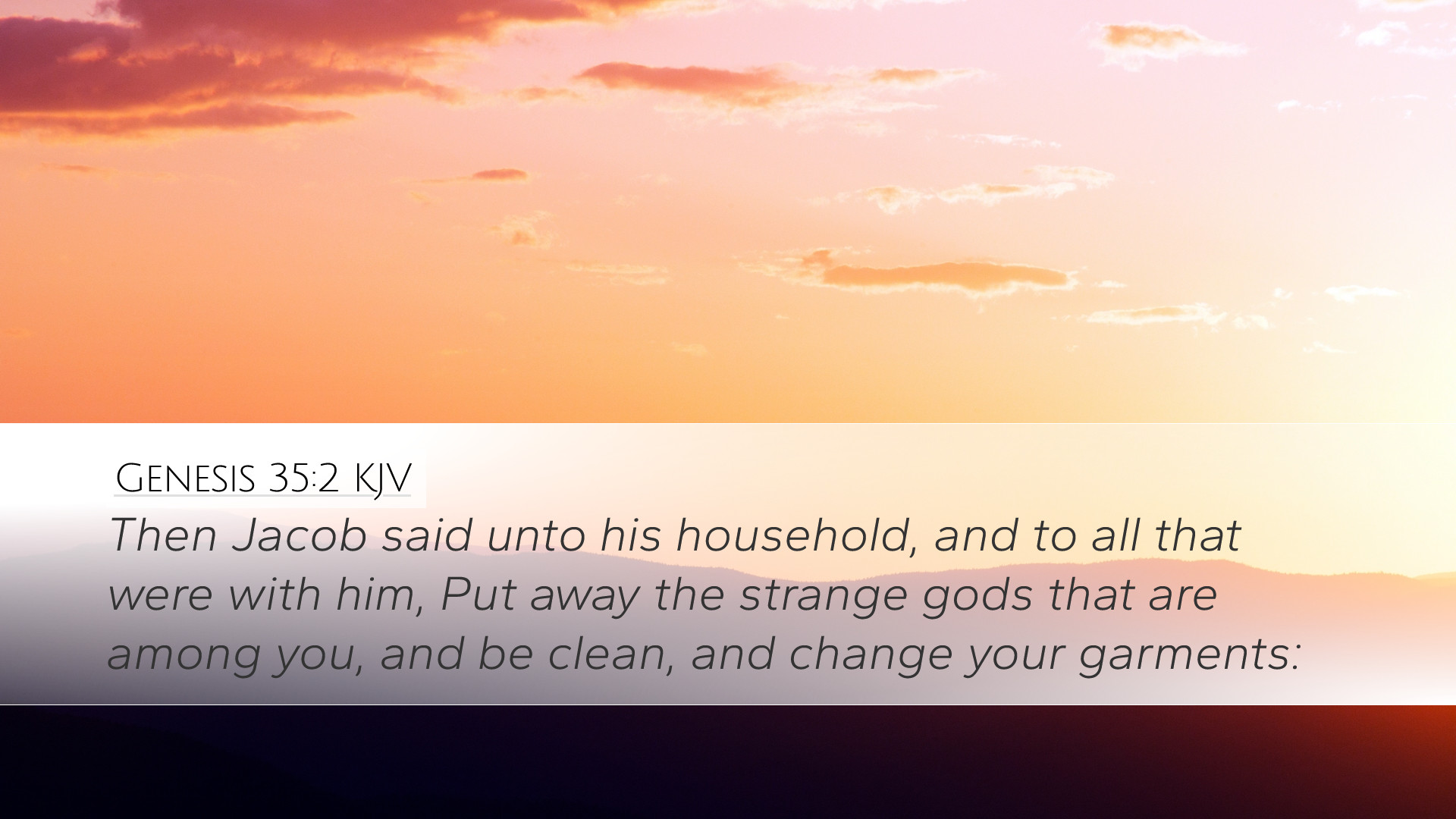Commentary on Genesis 35:2
Genesis 35:2 states: "Then Jacob said to his household and to all who were with him, 'Put away the foreign gods that are among you, and purify yourselves, and change your garments,'" (ESV).
This pivotal moment in Jacob’s life emphasizes his call to purity and devotion to God following the tumultuous events surrounding his life. Various commentaries provide deeper insights into the theological implications and historical context of this passage.
Contextual Background
Jacob, who was later named Israel, had just returned to Canaan after many years in Haran, where he served Laban. His family was amassed with foreign influences, especially idolatrous practices from his homeland. This verse serves as a transitional moment where Jacob seeks to reaffirm his covenant relationship with Yahweh.
Insights from Matthew Henry
Matthew Henry highlights that Jacob's command to “put away the foreign gods” indicates an understanding that his household had been influenced by idolatry. He posits that:
- Preparation for Worship: Henry points out that to approach God, one must first rid oneself of iniquity. Jacob was seeking to lead his family in true worship by cleansing them of all distractions and unholy influences.
- Symbolic Actions: The suggestion to “change your garments” signifies a change in state. The act of putting away foreign gods and changing clothes symbolizes a break from the past and an entry into a purified relationship with God.
Reflections from Albert Barnes
Albert Barnes provides a thorough examination of Jacob’s motives. He reminds readers that:
- Lead by Example: Jacob’s leadership is evident here. He understood that a household built on faith requires the head to take initiative against all forms of sin. By addressing the issue of idolatry directly, he modeled obedience to God’s commandments.
- Divine Purpose: Barnes indicates that Jacob was aware of the promises God had made to him. Purification was a necessary step in fulfilling God's purpose in his life and that of his descendants.
Ponderings from Adam Clarke
Adam Clarke offers a detailed exegesis of the actions taken by Jacob. He reflects on several aspects:
- Idol Worship: Clarke emphasizes the implication of having foreign gods present in the house of Jacob. The removal of these idols is essential for the reaffirmation of Israel’s identity as God's chosen people.
- Social and Spiritual Duty: The call to “purify yourselves” extends beyond mere physical cleanliness. Clarke suggests that Jacob was calling for a collective spiritual reawakening within his household.
Theological Significance
This command from Jacob to his household addresses several underlying theological themes:
- Monotheism vs. Polytheism: The passage starkly contrasts the singular worship of Yahweh with the polytheistic practices surrounding Jacob. This underscores the necessity of fidelity to the one true God.
- Community and Responsibility: The verse illustrates that faith is not merely an individual pursuit but a communal commitment. Jacob’s leadership affirms the responsibilities of family headships in spiritual matters.
- Transformation and Renewal: The acts of purifying oneself and changing garments are metaphors for spiritual transformation. This echoes broader biblical themes of renewal and sanctification found throughout Scripture.
Application for Today’s Community
The message of Genesis 35:2 remains profoundly relevant for today’s believers:
- Examine Influences: As modern-day disciples, it's vital to assess what influences might contribute to a lack of fervor in one’s spiritual life. The question Jacob puts forth echoes to us today: what foreign gods might we need to cast out?
- Lead with Intentionality: In a world filled with distractions, pastoral leaders and families alike are encouraged to lead proactively in faith, ensuring the spiritual health of their communities and households.
- Commit to Purity: The call to purity is explicit. Engage in practices that lead to spiritual renewal, whether through personal disciplines, corporate worship, or accountability within faith communities.
Conclusion
Genesis 35:2 encapsulates a profound moment of renewal and commitment in Jacob’s life. It serves as a timeless call to both individual and communal purity, reminding believers of the need to separate from that which distracts from genuine worship. Through the examination of public domain commentaries, we find rich theological insights that continue to challenge and inspire the faith community in our journey towards holiness and obedience to God.


